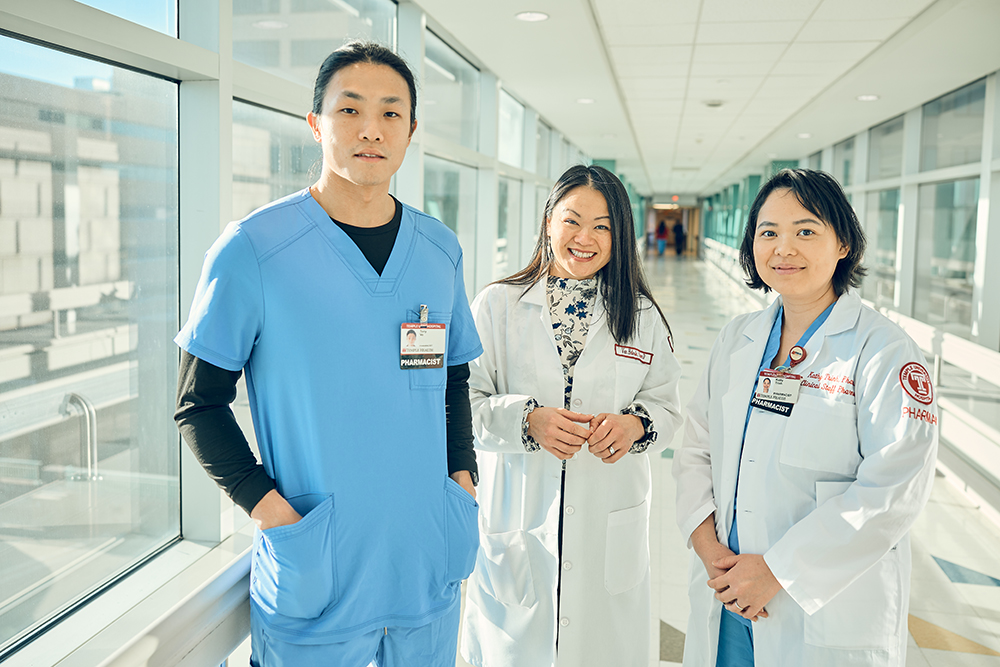
For Van Hellerslia, PharmD, BCPS, advocating for English as a second language (ESL) and immigrant patients is deeply personal.
“My parents and I came over from Vietnam, and I remember what it was like to have to face language barriers when they interacted with the healthcare system,” she explains. “I had to do a lot of the healthcare navigation for my parents, and act as their interpreter.”
Hellerslia went on to pursue a career as a clinical pharmacist, and is now a Clinical Associate Professor in Temple’s School of Pharmacy with a Clinical Practice site in the Department of Neurology at Temple Health - Main Campus. In her neurology pharmacotherapy practice, she sees a number of stroke patients. With her patients, she’s noticed that when English is a second language, especially if they come from an immigrant background, benefit from additional support to overcome language barriers.
“Many of these patients tend to be younger, and face challenging social determinants of health,” Hellerslia explains. “They work so hard to support their families that they don’t have time to go to the doctor. “And delaying medical care for a stroke can lead to more severe symptoms, even permanent disability.”
Communicating proper medication use is also essential for better outcomes. “We can prescribe all the right medications, but if we don’t do an effective job of explaining why a patient needs to continue taking those medications when they get home, they may decide to stop taking their medications when their refills run out,” Hellerslia says. “Stopping medication can lead to another stroke. This is an issue that matters to all of our patients, but it has a particular impact on our ESL and immigrant population.”
Community-Focused, Culturally Conscious Care
Hellerslia began to research differences in stroke outcomes among Asian-Americans, and found that they were driven primarily by socioeconomic and immigrant status. She also discovered that, in Philadelphia, Vietnamese is the #1 most underrepresented language among physician providers.
While Temple has multiple resources, including our Medical Interpreter Program, to ensure patients receive care in their preferred language, Hellerslia wanted to do something to address the issues she was seeing with ESL patients in her practice, specifically around stroke prevention and continued care. That got her thinking about pharmacists’ unique relationship with patients—as well as the large number of Vietnamese-speaking graduates from Temple’s School of Pharmacy.
“I started asking myself, ‘What if we could use those pharmacists to reach our Vietnamese-speaking patients?’” Hellerslia says.
With that goal in mind, Hellerslia decided to apply for a grant that would give her the resources to train Vietnamese-speaking pharmacists to be able to conduct community-based stroke education. Her goal was to increase stroke symptom recognition and emphasize the importance of calling 911.
She received the grant in the fall of 2021, and created an initiative called Viet-Capacity. During phase 1, she, along with her colleagues, delivered a one-day comprehensive stroke continuing education program attended by 30 pharmacists. From these attendees, she recruited 15 pharmacists, including multiple Temple Health employees, for a year-long project developing culturally appropriate stroke education materials to engage Vietnamese-American community members.
“We were so focused on thinking about our parents and other people in our community, and what would work for them,” Hellerslia explains. “We had to be very deliberate about certain cultural factors, like how we couldn’t talk about strokes when Lunar New Year was coming up, because it would be considered bad luck.”
Viet-Capacity also prioritized meeting community members where they were: “in temples, in churches, even in the supermarket.” Perhaps its most significant initiative, however, came through a partnership with the Philadelphia Police Department.
Hellerslia and her team worked with the PPD to create an audio simulation that could be played to show Vietnamese-speaking community members what they would hear if they called 911 to report someone having a stroke.
“I wanted them to know that there would be an interpreter on the other end of the line, and they would be able to understand what each other was saying,” Hellerslia says. “My hope was that, if they listened to this, they wouldn’t be so scared to call 911.”
Empowering the Next Generation
Ultimately, Hellerslia explains, Viet-Capacity’s goal was to increase the leadership capacity of the pharmacist-participants as much as it was to educate community members. “I wanted them to know they could teach people about recognizing the signs of stroke and calling 911 as well as the importance of following a medication schedule,” she says. “Ultimately, they managed to reach about 800 members of the Philadelphia Vietnamese community.”
Hellerslia’s goal, though, isn’t to have just one successful year of the program. She wants to build a sustainable model for this kind of work—which is why she’s already created her plan for its second stage.
“I’ll be working with Temple pharmacy and medical students from a group called IMPACT- (Interprofessional Multicultural Pharmacists and Students As Catalyst for Transformation) Capacity, some of whom are going to be trained by my Viet-Capacity pharmacists to continue our efforts in the Vietnamese community,” Hellerslia explains.
“Others in the group are going to go into a North Philadelphia elementary school with a large refugee and immigrant population. Their goal will be to develop tools that will help the children recognize the signs of a stroke, teach them to their parents, and be able to call 911 if they ever see someone having one.”
Hellerslia hopes that these children will not only benefit from stroke education, but also from seeing young medical and pharmacy students that look like them. “It would be great if that could inspire them to want to go into medicine or pharmacy,” she says.
It’s hard not to think, then, of her as a young girl, translating for her parents—or to imagine a more inspirational figure than Hellerslia herself.
